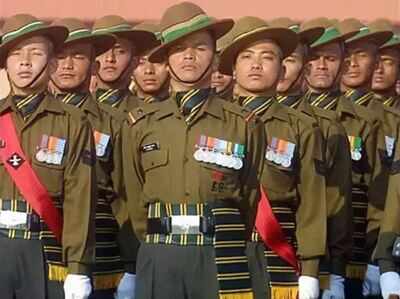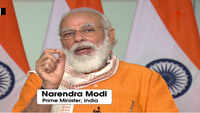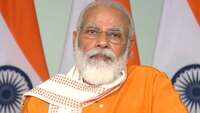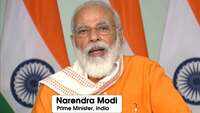
The 1947 treaty that Nepal signed with India and the UK allows them to hire Gorkhas in Army service. Now, demands for a review of the pact are being raised by Nepal. Early this year, Nepal wrote to the UK, highlighting that Gorkha veterans have long alleged discrimination in remuneration. According to Nepalese media reports at the time, the request for a review was made as Nepal planned to scrap or review all “discriminatory” pacts. Nepal’s demand for new bilateral arrangements has come amid strained relations between India and Nepal over the Kalapani issue, reports Ruchika Uniyal.
The ‘Gurkha recruitment’ pact
During the Anglo-Nepalese War of 1814-16, the East India Company suffered heavy casualties inflicted by Gurkha soldiers, forcing the British to acknowledge the valour of these warriors who fought with a kukri in hand — the insignia of all Gurkha Rifles regiments — and battle cry of ‘Ayo Gorkhali’ (Gurkhas are here).
Under a Peace Treaty signed later, Gurkhas were permitted to volunteer in the East India Company’s army. From these, the first Gurkha regiments were raised. When India became independent in 1947 there were 10 Gurkha regiments in the Indian Army. The three countries then signed a Tripartite Agreement which transferred four of these to the British Army; the remainder served in India.
Later, the British Army amalgamated their four regiments into Royal Gurkha Rifles (RGR) regiment deployed in its colonies of Hong Kong, Malaysia and Singapore. The Indian Army raised a seventh Gurkha battalion post independence.
Why Nepal wants the 1947 agreement reviewed
Nepal's fresh demand for new bilateral arrangements with the two countries comes amid strained relations between India and Nepal over the Kalapani territorial dispute. Nepalese foreign minister Pradeep Gyawali on Friday called the 1947 tripartite agreement “redundant” and a legacy of the past.
Earlier, the issue of Gurkhas serving in Indian Army was raised by Kathmandu when it objected to Indian Army chief General MM Naravane’s comments that Nepal was raising the border dispute at the behest of others. Nepal said the statement had “hurt sentiments of Gurkha army personnel who lay down their lives to protect India”.
Gyawali has argued that the 1947 pact had created a lot of jobs in the past, "but in the changed context, some of its provisions are questionable”. Early this year, Nepal wrote to the UK to replace the agreement with a bilateral one. The official request came after Nepal PM K P Oli had raised the issue with the then British counterpart Theresa May in London in 2019.
According to Nepalese media reports at the time, the request for a review was made to the UK since the present Nepalese government planned to scrap or review all “discriminatory” treaties and pacts. Terms of the tripartite arrangement laid that Gurkha soldiers in both armies should serve under broadly the same terms and conditions of service, but Gurkha veterans in British Army have alleged discrimination in remuneration and perks.
While Gurkhas in Indian Army have the same benefits as others, the British government started providing equal pay and pension to Gurkhas only in 2007. Gurkhas retire after 15 years of service, so the new guidelines made only those recruited after 1993 eligible for pension. But veterans have demanded compensation for the period they served without equal pay and other benefits. Gurkhas who served in the British Army before 1993 have also been deprived of both equal pay and pensions.
Contribution over the years
At present, Gurkhas comprise roughly 3% of the British Army. This year alone, over 12,000 applicants from across Nepal applied to become a Gurkha in the British Army. Meanwhile, at least 32,000 Nepalese Gurkhas are serving in Indian Army’s seven Gurkha Rifle regiments. The Gurkha Rifles have produced three Indian Army Chiefs – General Sam Manekshaw, General Dalbir Singh and General Bipin Rawat.
The ‘Gurkha recruitment’ pact
During the Anglo-Nepalese War of 1814-16, the East India Company suffered heavy casualties inflicted by Gurkha soldiers, forcing the British to acknowledge the valour of these warriors who fought with a kukri in hand — the insignia of all Gurkha Rifles regiments — and battle cry of ‘Ayo Gorkhali’ (Gurkhas are here).
Under a Peace Treaty signed later, Gurkhas were permitted to volunteer in the East India Company’s army. From these, the first Gurkha regiments were raised. When India became independent in 1947 there were 10 Gurkha regiments in the Indian Army. The three countries then signed a Tripartite Agreement which transferred four of these to the British Army; the remainder served in India.
Later, the British Army amalgamated their four regiments into Royal Gurkha Rifles (RGR) regiment deployed in its colonies of Hong Kong, Malaysia and Singapore. The Indian Army raised a seventh Gurkha battalion post independence.
Why Nepal wants the 1947 agreement reviewed
Nepal's fresh demand for new bilateral arrangements with the two countries comes amid strained relations between India and Nepal over the Kalapani territorial dispute. Nepalese foreign minister Pradeep Gyawali on Friday called the 1947 tripartite agreement “redundant” and a legacy of the past.
Earlier, the issue of Gurkhas serving in Indian Army was raised by Kathmandu when it objected to Indian Army chief General MM Naravane’s comments that Nepal was raising the border dispute at the behest of others. Nepal said the statement had “hurt sentiments of Gurkha army personnel who lay down their lives to protect India”.
Gyawali has argued that the 1947 pact had created a lot of jobs in the past, "but in the changed context, some of its provisions are questionable”. Early this year, Nepal wrote to the UK to replace the agreement with a bilateral one. The official request came after Nepal PM K P Oli had raised the issue with the then British counterpart Theresa May in London in 2019.
According to Nepalese media reports at the time, the request for a review was made to the UK since the present Nepalese government planned to scrap or review all “discriminatory” treaties and pacts. Terms of the tripartite arrangement laid that Gurkha soldiers in both armies should serve under broadly the same terms and conditions of service, but Gurkha veterans in British Army have alleged discrimination in remuneration and perks.
While Gurkhas in Indian Army have the same benefits as others, the British government started providing equal pay and pension to Gurkhas only in 2007. Gurkhas retire after 15 years of service, so the new guidelines made only those recruited after 1993 eligible for pension. But veterans have demanded compensation for the period they served without equal pay and other benefits. Gurkhas who served in the British Army before 1993 have also been deprived of both equal pay and pensions.
Contribution over the years
At present, Gurkhas comprise roughly 3% of the British Army. This year alone, over 12,000 applicants from across Nepal applied to become a Gurkha in the British Army. Meanwhile, at least 32,000 Nepalese Gurkhas are serving in Indian Army’s seven Gurkha Rifle regiments. The Gurkha Rifles have produced three Indian Army Chiefs – General Sam Manekshaw, General Dalbir Singh and General Bipin Rawat.
Download
The Times of India News App for Latest India News

Coronavirus outbreak
Trending Topics
LATEST VIDEOS
India
 We should occupy more mind space of China: S Jaishankar, External affairs minister
We should occupy more mind space of China: S Jaishankar, External affairs minister  Covid-19: India now ranks fifth in list of countries with most coronavirus deaths
Covid-19: India now ranks fifth in list of countries with most coronavirus deaths  Covid-19: Health Minister Harsh Vardhan chairs meeting with Department of biotechnology
Covid-19: Health Minister Harsh Vardhan chairs meeting with Department of biotechnology  Focusing on modernizing education system for quality: PM Modi at Smart India Hackathon
Focusing on modernizing education system for quality: PM Modi at Smart India Hackathon  Indian languages will progress due to changes in education policy: PM Narendra Modi
Indian languages will progress due to changes in education policy: PM Narendra Modi  New Education Policy framed keeping in mind aspirations of youth of 21st century: PM Narendra Modi
New Education Policy framed keeping in mind aspirations of youth of 21st century: PM Narendra Modi
More from TOI
Navbharat Times
Featured Today in Travel
Quick Links
Coronavirus in MumbaiCoronavirus in KolkataCoronavirus in HyderabadCoronavirus in DelhiCoronavirus in BangaloreCoronavirus symptomsCoronavirus in IndiaWhat is CoronavirusCoronavirus NewsSolar EclipseNPRWhat is NRCCAB BillCAB and NRCRTI BillPodcast newsLok SabhaShiv SenaYSRCPCongressBJP newsUIDAIIndian ArmyISRO newsSupreme Court
Get the app



